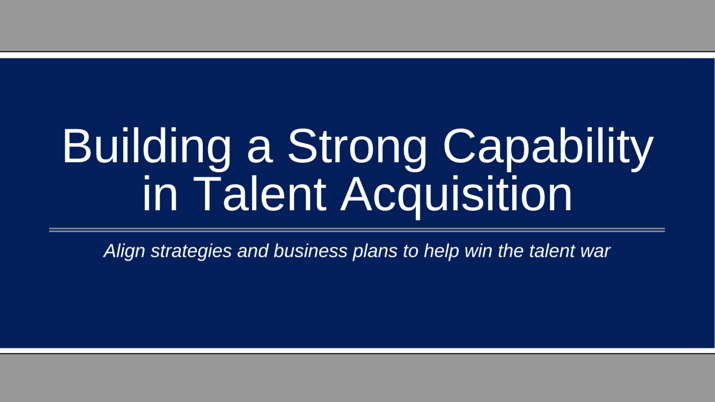Building a Strong Capability in Talent Acquisition

Last Updated December 18, 2014
Talent acquisition is quickly becoming a critical facet of the human resource function. Typically performed by a team of specialists, talent acquisition involves a variety of strategies that can help the organization plan for the future. It involves identifying short and long-term talent needs, developing internal talent and designing recruitment strategies to source talent from outside an organization. Talent acquisition may also involve establishing compliance standards, hiring standards and corporate hiring initiatives.
As organizations grow their talent acquisition capabilities, they can help the organization better align to business objectives and improve operational effectiveness while helping to advance the candidate experience.
Aligning recruitment strategies with business plans
Misaligned business and talent acquisition plans can leave an organization at a disadvantage in the battle for quality talent. The talent acquisition team should have some knowledge of strategy in order to establish credibility and common ground between HR and operating managers. In addition, a talent recruiting plan should align with the short and long-term business strategy.
Talent strategies are expected to meet these criteria:
- Determine and regularly review skills needed to meet business objectives
- Undertake a skills gap analysis to determine needs and understand the candidate pool
- Ensure talent is being used properly in the company, develop an internal mobility/succession plan
- Forecast for attrition to ensure against skills gaps
- Make sure diversity objectives are being met and reflected in the sourcing strategy
The better the talent acquisition team understands the business, the more likely it will be to develop acquisition strategies that reflect business needs.
Winning the talent war
Effective use of recruiting technologies can help level the playing field when it comes to finding the right candidate for a position. Improving candidate tracking systems, social media recruiting methods and job career websites can help build job applicant engagement and outreach.
For example, applicant tracking systems (ATS) such as Jobvite, HiringThing and Taleo, can help increase quality search capabilities and can make the job application process easier for candidates. Moreover, they can provide an effective interface to career and social media sites.
Creating an optimized candidate experience
The candidate experience is constantly adapting to help bring in new talent. For job candidates with hectic schedules, using talent acquisition tools such as video interviewing and mobile recruiting can help increase your chances of building a quality relationship with job candidates.
Another way to help personalize the talent acquisition process is to shorten the hiring process by engaging potential hires on career social media sites such as Career Builder and LinkedIn. Taking the time to do small things can shorten the time it takes to hire the right person and also increase the quality of the job applicants.
Advocating for insider advancement
Organizations that chart out internal talent acquisition strategies can help confirm existing employees are on the correct path toward developing their careers and responsibilities. Taking care of those who are already contributing to the business’ success affirms and supports a strong culture in many respects. It can help foster a climate where talent and hard work are recognized.
One way to ensure internal candidates are an important focus of the talent recruitment efforts is to establish an advocacy program to monitor and mentor them through the process. Members of the recruiting team are assigned to candidates who help them develop career goals and hone interviewing skills. They also work with candidates to identify new opportunities and responsibilities.
Acquiring the Knowledge to Lead Talent Acquisition Teams
Such facets of talent acquisition are among the areas of focus for master’s degrees in Human Resources. Advanced degrees in HR span competencies that are tactical as well as strategic. Learning the latest tools, proven processes and best practices that drive the HR discipline can help position individuals for prominent roles in the human resources industry.





